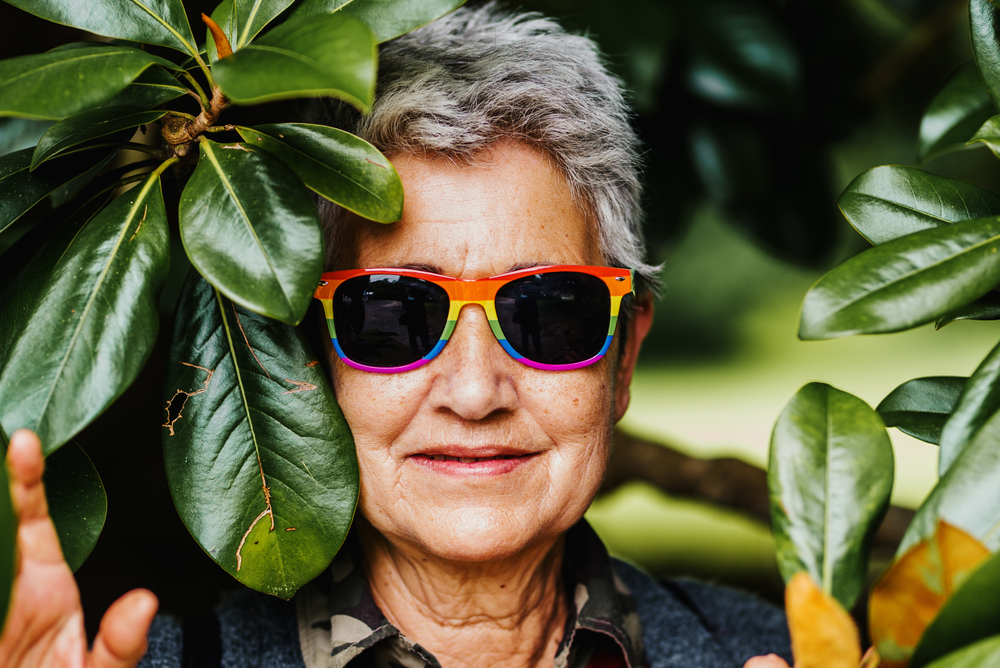Some of us are married to men, some of us are dating them, and some of us are chronically single. But we all have one thing in common: we are late to the coming out game.
So reads the introduction to r/latebloomerlesbians on the infamous discussion board, Reddit.
I am a mature aged woman with a teenaged kid and dogs and a husband. I have my first grey hairs, I talk about the status of my retirement funds, and I’m obsessed with growing pumpkins.
Oh, and I’m also gay.
If you had asked me 10 years ago where my life was headed, terms such as ‘divorced’, ‘single’ and ‘wlw’ wouldn’t have featured heavily.
And I sure as hell wasn’t expecting to find the key to my liberation on Reddit, renowned for its vile toxicity. And yet, this is exactly where I find myself.
This is my story through hashtags.
“But everyone experiments with their friends.”
Maybe. Maybe not. And definitely not with four or five of them over the years, from high school through to wedding bells.
When the tv show L Word first came out in 2004, I was already in my late 20s and married. Every week my friends and I would get together to watch it – some for the novelty factor, some for the joy of seeing the first proper visible representation of everyday life where lesbians were the main characters – albeit mostly white and wealthy – and some, like my sister, to seemingly express their moral superiority.
While my eyes were widening with the realisation of all the possibilities life could offer, my sister’s were narrowing in disgust.
Everywhere I looked, I saw rejection. Not just a rejection of a different way of living, but a rejection of myself.
Hashtags weren’t a thing yet, but women’s magazines like Cosmo had started running sealed sections on being “bi-curious”. Suddenly it was in vogue to fondle your friends, all in the name commercialised girl power (and with a heavy dose of the male gaze thrown in).
And so, I convinced myself that this was it. I was just fashionably curious.
“How do I know if I’m a lesbian?”
There is something so wonderfully absurd about the level of doubt we have regarding our own bodies. It looks like a duck, quacks like a duck, swims like a duck, and yet somehow our minds go: “Looks like an elephant to me”.
We go on Buzzfeed to test how gay we are, somehow expecting to find the truth to our inner beings in random algorithms created by a bunch of white boys in the Silicon Valley. Bit closer to the grassroots, we browse the “Am I a Lesbian?” masterdoc created by Tumblr users – all the while ignoring the message we already know.
Given the stranglehold of patriarchy and heteronormativity on our society, this is perhaps unsurprising. And yet, there is something unnerving about our willingness to give power to others to define who we are.
That’s when I learnt another term: #comphet.
Compulsory heterosexuality refers to the idea that most women are innately heterosexual. As described by the feminist poet, Adrianne Rich in 1980:
“The New Right’s messages to women have been, precisely, that we are the emotional and sexual property of men, and that the autonomy and equality of women threaten the family, religion, and state. The institutions by which women have traditionally been controlled—patriarchal motherhood, economic exploitation, the nuclear family, compulsory heterosexuality—are being strengthened by legislation, religious fiat, media imagery, and efforts at censorship.”
In addition to distorting the experiences of heterosexual women, comphet, according to Rich, has been used to erase the lesbian existence from much of the feminist scholarship.
This is why boards such as #latebloomers offer a vital outlet for women like me. It is hard to find yourself in a world that constantly renders you invisible.
@ashjensen Let me just 🌈✨💁♀️ #wlw #lesbiantiktok #lgbt #fypシ #xyzbca #queer #lesbiansover30🏳️🌈 ♬ Trono De Mexico Quien Piensa En Ti – 𝕸𝖎𝖘𝖊𝖗𝖞 • 𝕯𝖊 𝕹𝖎𝖗𝖔
“Sorry, nothing personal. It’s just that I don’t date women who’ve been with men.”
The first rejection stung, as rejections so often do. But this one cut deeper than the bog standard ‘it’s not you, it’s me’ most of us are subjected to at some point or another during our dating lives.
Barely liberated from the shackles of comphet suburbia, I was already failing as a queer person.
That’s when a group of friendly local queers came to my rescue, and I learnt yet another term. “You’ve come across a #GoldStarLesbian,” they explained.
(According to the dubious source of information, Wikipedia, in LGBT slang, a “gold star lesbian” is a lesbian who has never had sex with a man, and a “gold star gay” is a gay man who has never had sex with a woman.”)
The policing of the body is pervasive. In patriarchal societies a woman is always a body first, person second. And sometimes, whether we like it or not, the oppressed can also oppress.
@dibeherder #lesbiansoftiktok #goldstarlesbians ♬ original sound – Finding grace🏳️🌈
Dating when you’re young can be both hell and exhilarating, often at the same time. Dating in your 40s while trying to learn to navigate the app-driven digital mayhem and simultaneously figuring out the rules of same-sex dating is sometimes enough to make one contemplate a solitary life.
But while my ego may have been bruised, I came to understand that this interaction wasn’t a ‘sign’. It was just a bad fit. Gold stars or not, we are all entitled to choose whom we date, lest we police and oppress others ourselves.
“So what does this mean for you?”
At first there was an overcorrection. The younger and arguably better generations on TikTok brought out and made popular the fun aspects of the queer culture, and I was here for it, ready to make up for all the lost years.
@babygotlowerbackpain “Lesbian earrings” refers to a joke in the community that lesbians will turn anything into earrings.4 anyone who got pissy last vid ❤️#lesbianearrings ♬ follow me pls lmao – ash ⭐️
The first thing I learnt on TikTok is that lesbians can turn anything into earrings.
“I will violently unalive myself if you go out looking like that,” said the teenager dramatically as I was trying to insert an earring hook into a My Little Pony toy.
@bumbleeshoppeearrings Pan flag is next also hi everybody! 😁 #katespadenyhappydance #fypシ #lgbtqtiktok #lesbiansoftiktok #newtotiktok #earringstyle #esty ♬ Oh Adult, Oh Child – Halfy & Winks
Just to put your mind at rest: I looked smashing adorned by [the My Little Pony] ‘Twilight Sparkle’ and my teenager did not die.

My Little Pony is beloved by many in the LGBTI+ community, and introduced a lesbian couple into the show in 2019. Picture: Hina Ichigo /Flickr This photos is used under Creative Commons licence CC BY-NC-ND 2.0
In fact, I showed up at work, a perfectly respectable office environment, looking like I was permanently on my way to a queer rally, the years of silence replaced with an over-the-top visual display of sexual identity.
Coming out late – just like coming out at any age – is not without its risks to the individual. But there is also joy and freedom in knowing who you are, and having the emotional and financial security to finally live an authentic life. And sometimes, that liberation can come through hashtags.
As for myself, I eventually found my new equilibrium, where sexual identity is just one part of who I am, and not something I need to constantly perform.
I wish I could say that dating has gotten easier – it really hasn’t. But maybe some things never change.
@caseynicolax 😂😩 we just comfortable now 🏳️🌈🏳️🌈💕😂#fyp #foryou #foryourpage #lesbiantiktok #couple #lgtb #lesbiansoftiktok #comedy ♬ Radetsky March Classic Classic(829541) – Yuumi Iida
- Please note: Feature image is a stock photo, and not the author.
Sometimes a person has something powerful and important to say, but they need to stay anonymous because of a risk to their: safety (or the safety of those they love), employment or reputation. BroadAgenda doesn't publish these pieces lightly and takes them on a case by case basis.





